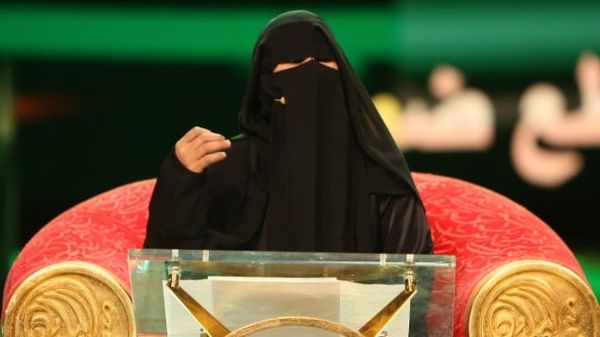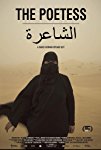Eye For Film >> Movies >> The Poetess (2017) Film Review
The Poetess
Reviewed by: Amber Wilkinson

This engaging documentary from Stefanie Brockhaus and Andreas Wolff follows a similar tack to 2008's Afghan Star, showing how a popular TV show can shine a light on cultural and culture wars within a country. Afghan Star was a slightly tweaked version of Pop Idol and The Poetess follows United Arab Emirates-based show Million's Poet, which adopts a similar format, even if the subject matter - Nabati poetry (sometimes known as 'people's poetry') - is rather more highbrow at first glance.
The contest pits poets from across the Persian Gulf and has enjoyed some of the highest TV ratings across the region. The 2010 season of the show - reflected upon during the course of this film - was notable for the presence of Hissa Hilal, also known by the pen-name Remia, a Saudi national who became the first woman to reach the show's final stages.

Brockhaus and Wolff include extensive interviews with Hilal, reflecting on the course of the competition, also following her and her daughters as they prepare to attend a family wedding, which gives a broader snapshot of the social fabric of their homeland. Her poet husband, whose approval was needed for her to participate in the competition at all, is also featured extensively, offering further insight into Hilal's life and a better understanding of the risks involved for the family as a whole.
"They will attack you for any simple thing," Hilal explains, as she discusses the importance of wearing the burqa perfectly onstage. This encapsulates just how high the stakes are for her even before she has opened her mouth, with moral judgements already being drawn. In a funny - yet not at all funny - moment, we see how the veil means she can't see properly to get off the stage, let alone read her poetry, meaning that for the rest of the contest, she opts to leave her eyes uncovered, although their are frequent references to her being concerned that her eyebrows are showing, indicating just how careful she feels she has to be.
The issue snaps even more strongly into focus when we see Hilal and some of her family on their way shopping in the car. When Hilal realises someone is filming them from another car, there is an immediate sense of panic as she tells her daughter and Brockhaus repeatedly to, "Cover your face!".
Unlike similar competition films which focus solely on the path to the final, Brockhaus and Wolff dovetail the current climate with a history lesson, largely offered through Hilal's recollections, of the way that religious doctrine has become increasingly rigid since the the 70s ("for intellectuals, that was their time," she says) and particularly following a 1979 terror siege in Mecca. We are left to draw our own conclusions about the differences between the more relaxed gender rules in Abu Dhabi - where in the audience, though segregated by sex - is half made up of highly made up women in stark contrast to Hilal's all-in-black figure onstage.
Hilal's way with words, and a carefully worded argument, is striking. She targets extremism through a particularly controversial poem concerning fatwas but goes to lengths to explain it is not specifically aimed at Saudi Arabia and she is careful to push the idea of the importance of letting women's voices be heard from a place of social conservatism. While it may have been difficult to obtain, more from regular members of the public would be welcome here, to give a sense of the wider impact of Hilal's fame. We hear of abuse on message forums, but there must have been supporters too and its a shame these voices are absent.
Saudi Arabia's King Salman has relaxed some rules in Saudi Arabia in recent months, not least decreeing an end to the ban on women driving. You can't help but feel that these changes are at least in part being driven by the courage of those like Hilal - her comments may be veiled in more ways than one, but they're no less powerful for that.
Reviewed on: 02 Apr 2018
















